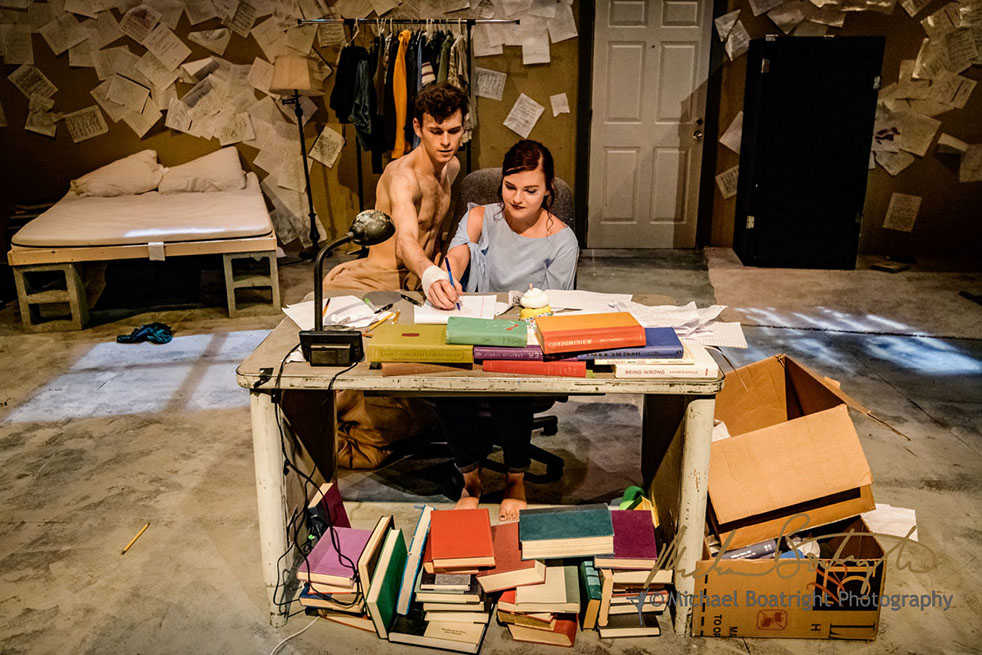Over the course of Bryce Irvin’s “Post Mortem”, a nineteen-year-old writer dies, falls in love with his dead fish, comes to terms with a childhood tragedy and is later revived by the powers of a magical wishing system.
Although this plot may seem a little absurd even for Dramatech, it offers much more to its audience than what is first absorbed during its performance.
The play opens with Toby Olsen (Mikael Bucknavage) asleep across his desk, surrounded by a forest’s worth of crumbled notebook paper and books scattered accross the floor. He is soon visited by a certain Postman (Thomas Glenn) who wakes him and delivers the news that Toby is actually dead. It is later revealed that, pathetically enough, Toby died of a simple papercut — or rather, an infection from a papercut.
After this storm of shocking information passes, the Postman attempts to cheer Toby’s spirits by introducing him to two new characters that are later learned to be anthropomorphized versions of Toby’s childhood pet fish. Romeo (Autumn Siebold) and Juliet (Alex Boulware) are betta fish, constantly fighting, and this adds to the royal confusion and chaotic humor of the play.
Irvin’s underhanded use of irony also provides for great entertainment throughout the performance. For example, Toby’s obsession with promptness and constant worry that his library books are overdue is met with laughable confirmation by the Postman asserting that yes, Toby is dead and is of course “late.”
The actors themselves do a lovely job of fully presenting the personalities in Irvin’s writing. Each one exhibits a fully developed personality and expresses thoughts that drive the plot into well-rounded completion.
Bucknavage is a powerful lead, and his assured presence on stage is evident in the confident strength that rings in his voice. He fully embodies the character of Toby, and the audience is able to sympathize for him as he slowly reveals his character’s troubled past and the death of his parents.
Glenn plays an underworld-type Postman whose tendency to successfully carry out his “job” sometimes wavers during select points of the play. His relatable expressions of innocence and a desire to please others allows him to become an audience favorite as the play progresses. With the help of the sound team, his stage presence is greatly amplified by a classic and appropriate demon-style voiceover of his lines.
Siebold demonstrates a highly determined Romeo who finally forces the truth out of Toby. Her acting is beautiful in the way that, even when her character is not the focus of a scene, she can be seen giving integral insight through her body language. It is impressive that “Post Mortem” is her first show with DramaTech, for she seems like she has been at home here for years.
Similarly, Boulware plays a loveable and insightful Juliet whose innocence and lack of exposure to Toby’s flaws cause the audience to empathize with Romeo’s desire to protect her. Her monologue on the meaning of being a fish — with thumbs — provokes thought into the parallels of the meaning of all life. The genuineness of her spoken thoughts reaches the minds of the audience and allows them to make connections to life outside of the theater.
It is the calculated mixing of such strong and contrasting theatrical personalities that makes this four-cast-member play so superior. Between the fighting, yelling, cursing, and other various antics, the audience learns more about the characters’ dynamics than is explicitly said. Irvin can be extremely proud of the manner in which his script is elevated to a living commentary on life’s value and offerings.
As far as the physical aspect of the play, the set resembles something that does not stray far from what can be seen in the dorms here at the Institute. The sight of crumpled papers with scribbled ideas is not unfamiliar to the audience, and it is effectively coaxed into the realm of the play.
It should be noted that the entirety of the storyline takes place in Toby’s room. The use of such a small environment allows for the audience to feel as if they were there with the characters. This forces watchers to engage in the conversations being presented, and Irvin’s ideology becomes even more compelling.
Massive kudos go to the designers and all of the off-stage members of the crew for this reason. Such purposeful use of characters, setting and design ultimately leaves no room for disappointment with the audience.
Newly gained perspectives on life, childhood and mending life’s wounds make “Post Mortem” go down as one of the reasons that DramaTech remains to be such an appreciated, essential piece of student life at Tech.
A huge congratulations to all who contributed to the successful making of this play.
